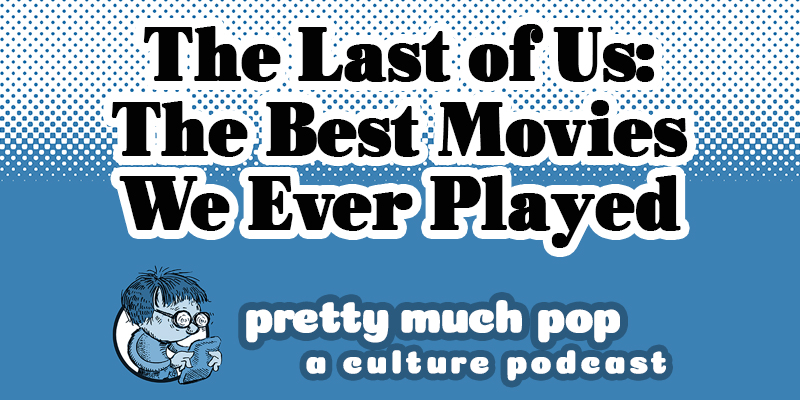“The Last of Us” Franchise: Can Video Games Be Cinema? A Pretty Much Pop Culture Podcast Discussion (#64)

Your Pretty Much Pop hosts Mark Linsenmayer, Brian Hirt, and Erica Spyres all played both The Last of Us, and more recently immersed themselves in the lengthier The Last of Us 2, which has been generating a lot of acclaim but also controversy. Actually, Erica just watches her husband Drew Jackson play these things, but he showed up to this discussion too. Yes, these creations of Neil Druckmann with the Naughty Dog team are groundbreaking, and riveting, but by design not necessarily “fun,” or thereby involving much “playing.”
The franchise is ostensibly about a zombie apocalypse and an immune girl that might be its cure, but it’s really a drawn-out drama about loss, family, and the cycle of revenge… You know, in between running around looking for scraps to craft weapon upgrades and skulking around driving shivs through the necks of numerous monsters and people.
We compare The Last of Us to other zombie media like Walking Dead, address the shifting points of view in the game (playable flashbacks!), representation, fan and critical reaction, the effectiveness of the game’s message, and more.
This conversation should work both for listeners who’ve actually played the games and those who are just curious about what the fuss is about. There are some plot spoilers about the end of the first game and events near the beginning of the second game necessary to discuss the narrative.
Listen to the official Last of Us podcast. For another player perspective, check out the Besties podcast.
Other resources:
- “The Not So Hidden Israeli Politics of ‘The Last of Us Part II‘” by Emanuel Maiberg
- “The Last of Us Part 2 Review – Post-Apocalyptic Game Is Groundbreaking and Powerful” by Keza MacDonald
- “The Last of Us Part 2 Review Round-Up: What Critics Have Said About the ‘Groundbreaking, Emotional Masterpiece’ PS4 Sequel” by Alex Finnis
- “The Last of Us Part II’s Queer Representation is Groundbreaking. Is It Enough?” by Louis Chilton
- “The Last of Us Part I & II: How Their Zombies are Based on Real-Life Undead” by Coleman Gailloreto
- “The Last of Us 2 Has Sold 4 Million Copies, Breaking Sony’s PS4 Record” by Andy Robinson
Learn more at prettymuchpop.com. This episode includes bonus discussion that you can only hear by supporting the podcast at patreon.com/prettymuchpop. This podcast is part of the Partially Examined Life podcast network.
Pretty Much Pop: A Culture Podcast is the first podcast curated by Open Culture. Browse all Pretty Much Pop posts.
“The Last of Us” Franchise: Can Video Games Be Cinema? A Pretty Much Pop Culture Podcast Discussion (#64) is a post from: Open Culture. Follow us on Facebook, Twitter, and Google Plus, or get our Daily Email. And don't miss our big collections of Free Online Courses, Free Online Movies, Free eBooks, Free Audio Books, Free Foreign Language Lessons, and MOOCs.
from Open Culture https://ift.tt/3lSbd49
via Ilumina
Comments
Post a Comment